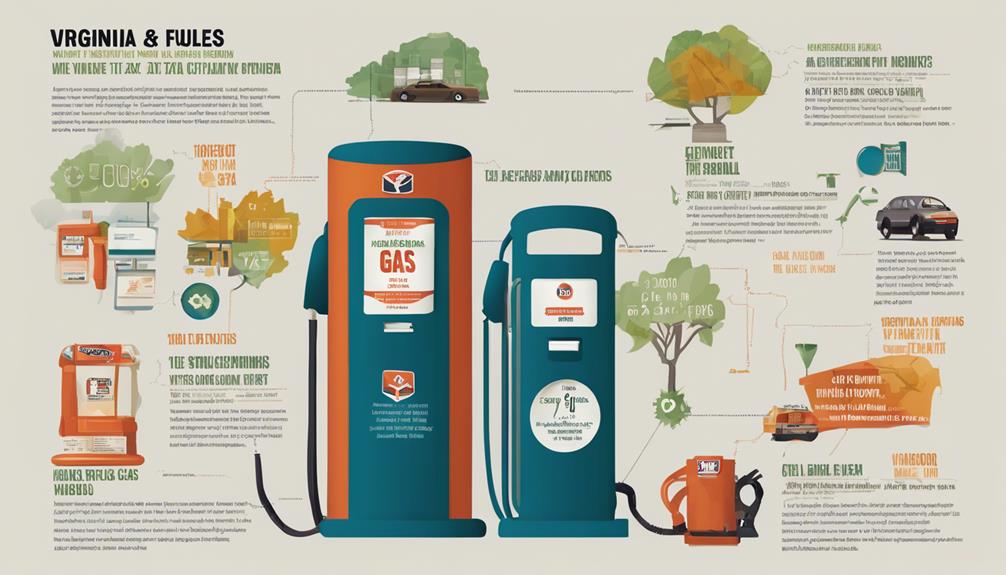When you consider the Virginia Fuels Tax Distributor Bond, it's essential to grasp its role in maintaining financial integrity within the fuel distribution sector. This bond not only ensures compliance with tax regulations but also safeguards state revenue, which is crucial for public services and infrastructure. However, the requirements for eligibility and the implications of non-compliance can be quite complex. What happens if a distributor fails to meet these obligations, and how does this affect the broader industry? Let's explore these critical aspects further.
Overview of Fuels Tax

Fuels tax plays a crucial role in funding transportation infrastructure and public services in Virginia. When you fill up your gas tank, a portion of the price you pay goes towards this tax. It's designed to help maintain and improve roads, bridges, and public transit systems that you rely on daily.
Understanding how this tax works can help you appreciate where your money goes. In Virginia, the fuels tax is levied on gasoline and diesel fuel. The tax rate can fluctuate based on market conditions and state regulations, ensuring that it remains effective in generating revenue.
You mightn't realize it, but these funds support essential projects and services that enhance your commuting experience. Moreover, the fuels tax contributes to environmental initiatives aimed at reducing emissions and promoting cleaner energy alternatives.
Purpose of Distributor Bond
The distributor bond serves as a financial safeguard for the state of Virginia, ensuring that fuel distributors comply with tax regulations. When you obtain this bond, you're essentially guaranteeing that you'll fulfill your tax obligations, thereby contributing to the overall stability of the fuel industry.
This protection is crucial for the state, as it helps maintain revenue flow and prevents tax evasion; fuel tax bonds also support necessary infrastructure funding.
By securing a distributor bond, you're also building trust with your customers and the state. It shows that you're committed to operating within the law and upholding the integrity of the fuel distribution industry.
Should you fail to meet your tax responsibilities, the bond provides a financial remedy, allowing the state to recover any unpaid taxes.
Moreover, the distributor bond can enhance your business's credibility. It signals to potential partners and clients that you're a responsible player in the market.
This can lead to better business relationships and potentially more opportunities.
Eligibility Requirements

To qualify for a Virginia fuels tax distributor bond, you'll need to meet specific eligibility requirements set by the state.
First, you must be a licensed distributor of fuel in Virginia. This means you've registered with the Virginia Department of Taxation and hold the appropriate permits to handle and distribute fuel.
Next, you should have a solid financial standing. Your credit history plays a crucial role, as surety companies will assess your creditworthiness before issuing the bond. If you have a strong credit score, you'll likely find it easier to obtain the bond at a favorable rate.
Additionally, you'll need to demonstrate your compliance with all applicable state and federal laws regarding fuel distribution. This includes adhering to tax regulations, environmental standards, and safety protocols.
Lastly, it's important to maintain a clean legal record. Any past violations or criminal convictions related to fuel distribution may impact your eligibility.
Application Process
Navigating the application process for a Virginia fuels tax distributor bond requires careful attention to detail and organization.
First, gather all necessary documentation, including your business information, financial statements, and any relevant licenses. This paperwork will demonstrate your compliance with state regulations and your ability to meet the bond's requirements.
Additionally, it's important to be aware that cigarette tax bonds serve a similar purpose in ensuring compliance for different distributors, highlighting the importance of financial guarantees in regulated industries.
Next, you'll need to choose a surety company that specializes in fuel tax bonds. Reach out to them to request an application form. Complete the form accurately, ensuring that all information is truthful and up to date. Any discrepancies might delay your application or result in rejection.
Once you submit your application, the surety company will conduct a review, which may involve checking your creditworthiness and business history. They might ask for additional information, so be prepared to respond quickly to any requests.
After approval, you'll receive a quote for your bond premium. If you agree to the terms, you can finalize the bond and pay the premium.
Bond Amounts and Terms

Understanding bond amounts and terms is essential for anyone applying for a Virginia fuels tax distributor bond. The bond amount typically reflects the estimated taxes you'll collect and remit to the state. For most distributors, this amount is set at $100,000, but it can vary based on your specific situation and business needs.
You'll need to maintain this bond for the duration of your business operations, ensuring you comply with state regulations. The bond acts as a financial guarantee that you'll adhere to tax laws and obligations related to fuel distribution. If you fail to meet these obligations, the bond can be used to cover any unpaid taxes, protecting the state and your customers.
Term lengths for these bonds usually span one year, but they can be renewed annually. This means you'll need to stay on top of your bond status and ensure timely renewals to avoid any lapses that could affect your ability to operate.
Compliance Obligations
Complying with state regulations is critical for fuel distributors in Virginia. As a distributor, you must ensure that you're properly registered with the Virginia Department of Taxation. This involves submitting an application and paying any required fees.
You'll also need to maintain accurate records of all fuel transactions, including sales and purchases, to facilitate audits by state authorities. Additionally, understanding your obligations related to mileage tax bonds can further enhance your compliance efforts.
Furthermore, you must file tax returns on time, typically on a monthly basis. It's essential to calculate and remit the correct amount of fuel tax, as any discrepancies can lead to penalties or interest charges.
Familiarizing yourself with the current tax rates and regulations will help you stay compliant. Additionally, keep your distributor bond active and ensure it meets the necessary amounts set by the state.
If you ever make any changes to your business structure or operations, you need to update your registration and bond accordingly.
Claims Against the Bond

Claims against the Virginia fuels tax distributor bond can arise when a distributor fails to meet their obligations, leading to financial losses for the state or affected parties.
If you're a distributor, it's crucial to understand that your bond serves as a form of financial security for the state and consumers. When you neglect to pay taxes or comply with regulations, the bond may be called upon to cover those financial shortfalls.
Affected parties, such as the state or local governments, can file claims against the bond to recover unpaid taxes, penalties, or fees. This means that if you fall behind on your obligations, the bond company may step in to pay the claim, but they'll expect you to reimburse them for that amount.
It's essential to manage your operations diligently and stay compliant to avoid claims. Not only can a claim against your bond harm your reputation, but it can also lead to higher premiums or even difficulties in securing future bonds.
You should prioritize fulfilling your obligations to protect your business and maintain a good standing in the industry.
Renewal and Cancellation
Maintaining your Virginia fuels tax distributor bond is vital for the health of your business and its compliance with state regulations. You'll need to ensure timely renewal to avoid lapses that can lead to penalties or disruptions in your operations. Typically, your bond will have a specified term, often one year, after which it needs renewal.
To renew, you should review your bond terms and contact your surety provider well before the expiration date. They might require updated financial information or other documentation to evaluate your risk level. Once approved, you'll receive a new bond that replaces the old one, keeping your compliance status intact.
Cancellation can occur for various reasons, such as a change in your business operations or a decision to discontinue your fuel distribution activities. If you plan to cancel your bond, notify your surety company in writing and provide any necessary documentation.
Be aware that canceling your bond doesn't absolve you from past obligations, so ensure all claims are settled before proceeding. Staying proactive with your bond management helps safeguard your business and maintain your good standing with the state.
Impact on Fuel Distributors

Frequently, the impact of the Virginia fuels tax distributor bond on fuel distributors is significant. This bond acts as a financial safety net, ensuring compliance with state tax regulations. If you're a distributor, you'll need to secure this bond to operate legally in Virginia.
Not only does it protect state revenues, but it also helps maintain fair competition among distributors.
The bond amount can vary, which means you may have to allocate substantial resources to meet the requirements. This can strain your finances, especially if you're a smaller distributor.
Additionally, securing the bond often involves underwriting, which could lead to higher premiums based on your creditworthiness and business history.
You'll also find that maintaining the bond requires ongoing compliance with state regulations. Failing to meet these requirements could result in penalties or even suspension of your license.
This not only affects your operations but can also damage your reputation within the industry.
Conclusion
In summary, the Virginia Fuels Tax Distributor Bond plays a vital role in ensuring fuel distributors meet their tax obligations, protecting state revenues and infrastructure. By understanding the bond's requirements and maintaining compliance, you can avoid penalties and ensure your business runs smoothly. Remember, keeping up with renewals and monitoring your financial standing is key to your success in this industry. Stay informed and proactive to safeguard your operations and maintain your license to distribute fuel in Virginia.

